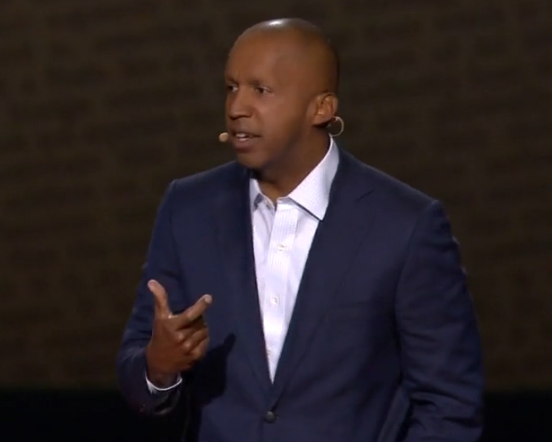Well I believe that our identity is at risk.
我相信這說明我們有定位危機。
That when we actually don't care about these difficult things,
當我們對這些棘手的問題置之不顧時,
the positive and wonderful things are nonetheless implicated.
我們卻仍舊對那些正面的好事兒一如既往地關心。
We love innovation. We love technology. We love creativity. We love entertainment.
我們愛極了革新。我們愛技術。我們愛創造。我們愛娛樂。
But ultimately, those realities are shadowed by suffering, abuse, degradation, marginalization.
但是最終,這些好的現實都被痛苦煎熬,濫用職權,剝奪人權,邊緣化,蒙上了陰影。
And for me, it becomes necessary to integrate the two.
對于我來說兩者合一是必要的。
Because ultimately we are talking about a need to be more hopeful,
因為最終我們談的是怎么更有希望,
more committed, more dedicated to the basic challenges of living in a complex world.
更有保障,更有貢獻,來應付生活在這個復雜社會中的種種挑戰。
And for me that means spending time thinking and talking about the poor, the disadvantaged, those who will never get to TED.
對于我來說,那需要花時間思考和討論窮人階層,弱勢群體,那些永遠也沒機會來TED的人。

But thinking about them in a way that is integrated in our own lives.
不過想著其實在某種意義上是把他們融合進我們的生活里。
You know ultimately, we all have to believe things we haven't seen. We do.
要知道最終,我們得相信那些沒親眼見的事。我們不得不。
As rational as we are, as committed to intellect as we are.
作為理智的社會,這么聰明的社會。
Innovation, creativity, development comes not from the ideas in our mind alone.
革新,創造,發展,并不僅僅在我們腦子里空想出來的。
They come from the ideas in our mind that are also fueled by some conviction in our heart.
它們是從我們腦子里的智慧和我們心里的信念相結合的產物。
And it's that mind-heart connection that I believe compels us to not just be attentive to all the bright and dazzly things, but also the dark and difficult things.
這個靈智合一,我相信會驅使我們不僅僅是對那些光明的事情更上心,同時對那些黑暗面和棘手的事情也是一樣。
Vaclav Havel, the great Czech leader, talked about this.
韋克拉烏·哈韋爾,這位捷克的杰出領導人,談過這個問題。
He said, "When we were in Eastern Europe and dealing with oppression, we wanted all kinds of things,
他說:“當我們在東歐解決強制壓迫的問題時,我們希望能成就很多,
but mostly what we needed was hope, an orientation of the spirit, a willingness to sometimes be in hopeless places and be a witness."
但是最重要的,我們要一個希望,一個心靈的指向,一種不憚于體會絕望的態度,以及為史留證的意愿。”











